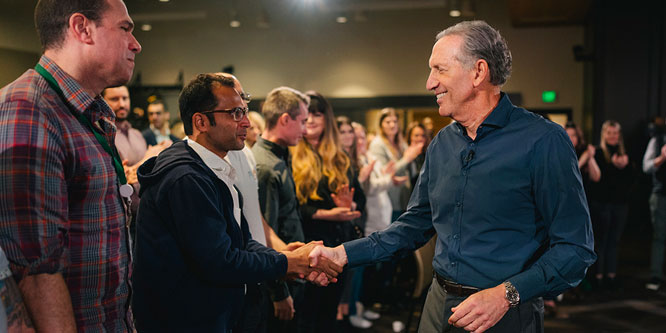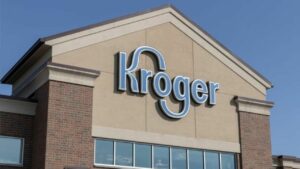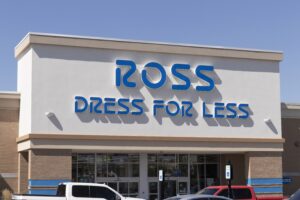
Photo: Starbucks
April 5, 2022
Did Howard Schultz make a wise course correction on his first day back at Starbucks?
He’s back. Howard Schultz has started his third turn at leading Starbucks and it didn’t take him long to get the attention of the coffee giant’s stakeholders.
Mr. Schultz, writing a letter to associates that the company shared publicly, said Starbucks was immediately suspending a share buyback program announced just three weeks earlier. Doing so, he wrote, “will allow us to invest more profit into our people and our stores — the only way to create long-term value for all stakeholders.”
Starbucks’ decision to suspend buybacks follows the Biden administration’s budget proposal for fiscal 2023 that seeks to limit corporate executives from personally benefiting financially from the sale of shares in such instances. The proposal, should Congress include it in the budget it passes, would prohibit executives from selling shares in any year that a company announces a buyback.
Investors were not ecstatic about Mr. Schultz’s decision. The company’s stock was down 3.72 percent in premarket trading this morning.
Mr. Schultz’s audience, however, is not comprised solely of those interested in reaping greater shareholder value. He begins his new term as interim CEO knowing that he may not have much time to set the company back on the right track, as he sees it.
That road begins with reconnecting with Starbucks baristas. The chain faces a small but growing push for unionization at its stores. Ten locations to this point have voted in favor of joining Starbucks Workers United, the latest being the chain’s flagship Reserve Roastery in Manhattan. More than 180 of the 9,000-plus Starbucks in the U.S. have filed petitions for union votes.
Mr. Schultz wrote that he will be traveling along with other company leaders in the coming weeks to meet with employees in stores and at manufacturing plants. The purpose, he expressed to them, is “to understand your thinking and ideas about how to build this next Starbucks.”
He also said the company would “engage in design sessions with partners of all levels across the organization to co-create a future of mutual thriving in a multi-stakeholder era. We see these sessions as the deepest form of inventing together we’ve ever attempted as a community.”
Discussion Questions
DISCUSSION QUESTIONS: Do you agree with Howard Schultz that investing more of Starbucks’ profits into people and stores is “the only way to create long-term value” for the chain? How likely is it that Starbucks will be able to convince most of the stores petitioning union votes to reject Starbucks Workers United?
Poll
BrainTrust
Jeff Sward
Founding Partner, Merchandising Metrics
Cathy Hotka
Principal, Cathy Hotka & Associates
Lee Peterson
EVP Thought Leadership, Marketing, WD Partners
Recent Discussions







There’s just something about Mr. Schultz that exudes caring and thoughtful leadership. Immediately suspending share buy-backs to explicitly focus on operations and employees, is exactly the right message. While the unionization push is gaining momentum, Schultz has the credibility, likability and trust to steer the ship back on course. And while there will always be some segment of their employee base that will look to disrupt, I believe that the vast majority of employees can be won back by Schultz. It won’t be easy, but if anyone can do it, it’s Howard Schultz.
Agreed. A labor attorney told me a long time ago that people don’t vote for a union, they vote against management. An old adage is if you want good people — treat them good. Mr. Schultz’s approach embodies both.
There is nothing wrong with share buybacks, per se. However, they should not be to the detriment of investment in the company. And Starbucks does need to invest. It needs to invest in its people, its stores, its food proposition, its retail offer, and so many other things. It is not performing badly, but there are a massive number of niche coffee brands and chains which are seeing very strong growth. Starbucks needs to keep innovating if it is to stay ahead of this threat.
A company should execute stock buy-backs only when they have nothing internally to increase the value of the company. Simply, if the internal spending cannot move the company forward, give it to the shareholders.
Make no mistake, the unionization movement is targeting some of the best retailers like Apple and Starbucks. His job is to stop the unionization of more stores. This is a first step.
Union power and membership reached a high point in the U.S. during the 1940s and 1950s. The coincides with the greatest growth in the American economy and the smallest measure for income and wealth inequality in over 100 years. As worker power began to wain, inequality grew. From 1978 to 2020, CEO pay based on realized compensation grew by 1,322%, far outstripping S&P stock market growth (817%). In the last three decades, labor wages had NO growth when adjusted for inflation. Is a CEO worth 1,322% more now than he/she was in 1978?
Gene,
Quick answer? No.
Too soon to tell whether this a cynical, personal financial move (freedom to sell shares) or he really means it. On the one hand, unions will kill Starbucks. On the other hand, there are a bazillion of them, so if one gets shut down because it went union, there’s a bazillion -1 left. If the pro-union folk think this is going to be a good thing, watch how fast they hit the unemployment line. Starbucks management has been great at sorrowfully pointing out that poor performing stores close.
I welcome the return of Howard Schultz. Starbucks is a subtle operation to run — perhaps exactly because it depends more on the people who work there. Or simply because Schultz has an unusual ability to recognize that and to help those people feel valued — or more valued than they do in so many other companies which treat them like cannon fodder.
All retailers should pay attention — front line employees need respect, not more rules which dehumanize them.
I suspect that, Schultz has had the luxury of looking at Starbucks from the outside and to expose himself to more of the daily rhetoric in business. There is a realization in retail that employees are an asset, not a burden, and one takes care of one’s asset. So are stores an asset, and a longe-term asset at that. That is where money and attention should go for the long-term gain.
Bob, I like your choice of words. For too long, retailers have looked at employees as an expense rather than an ASSET.
When a company has excess cash, there are only three alternatives to do with that cash: 1. Give it to the shareholders (dividends and stock buybacks), 2. Buy or merge with another company, 3. Invest in plant and people. The best alternative is the one that increases the value of the company. #1 increases the value of the shares. #2 is a fool’s errand. #3 is the future.
“People” have been Shulz’s mantra each time he has led the company. His latest moves do not surprise me at all. I suspect he is leading the company again precisely because of the announcement of the stock buy-back. He would rather see the company invested in the company rather than artificially raising the stock price.
I do not believe that unionization is a big issue with Shultz. He believes that SBX can keep even union workers happy with benefits that don’t exist for most retail companies.
Mr. Schultz is smart to invest in his people, as the employee experience directly affects the customer experience. As the power dynamic shifts in workers’ favor, more companies will prioritize these influential stakeholders.
Starbucks’s success in slowing unionization momentum depends on how soon workers feel heard, understood and valued. What are workers’ core unmet needs? Empathy and conversation will help Starbucks get to the root of workers’ dissatisfaction and start solving it.
Sure, short-term investors are upset. Long-term investors should be thrilled.
I’m excited that Howard Schultz is back. More than ever, companies/brands (from any type of business) need to find the balance between people and profits. Mr. Schultz knows this and is more than capable of finding that balance. If he’s not going to be our US President (at one time there were rumors), I like that he’s using his leadership skills to continue the success of an iconic brand.
No one can re-energize a company like the person who started it. Starbucks was one of the first trailblazers to focus on the quality of both the customer and the employee experience, which garnered them tremendous loyalty from both staff and customers alike. In recent years the company’s focus has shifted away from the quality of the experience toward speed and convenience, which is a losing game fraught with high competition and disloyalty.
What originally made Starbucks great was offering that “third place” between home and office. But as work from home has grown — compounded by COVID — the company has gone too far toward “to-go” orders and undermined their in-store environment. Reinvesting in the experience will give housebound remote workers that desperately needed third (and second) place to be, and give employees back their dignity and ability to engage with live customers rather than crank out mobile orders from a computer screen. I for one am relieved to see Howard’s return!
I recently attended the Food Marketing Conference at Western Michigan University and one of the keynote speakers was the CEO of Spartan Nash. He presented a very convincing argument on the importance of a “People First” strategy. The only way to be successful in business, especially now that employees have so many options, is to provide a workplace, whether face-to-face or virtually, is to treat your employees as your most valuable asset and that includes making them more important than even your shareholders.
If you believe that customer experience is a significant force in a company’s success, then Howard Schultz did the right thing on his first day back! The heart and mindset of Starbucks have been being the third place: a warm, comfortable, and uplifting feeling experienced in every store. You cannot deliver on that core value without a happy workforce. The baristas are vital to the brand and what Mr. Schultz has done is demonstrate his very public commitment to them and Starbucks’s future.
Precisly: the heart and mindset of Starbucks have been being a warm, comfortable, and uplifting feeling experienced in every store. You cannot deliver on that core value without a happy workforce.
Absolutely the right move.
Compare to Day 1: Amazon warehouse workers form their first union, which they say they had time to do because Bezos was so focused on going to space, Day 2: Amazon announces BILLIONS on more space missions.
If you were the CEO Andy Jassy and you had the resources and skills to launch a satellite-driven broadband network, would you pass on that opportunity? Amazon is not all about retail. We have seen that each effort can stand on its own. Dollars on one doesn’t mean less dollars for others.
It is 110% the right decision. While I love the company and the people who work for it, the coffee is terrible and overpriced. So, the real asset isn’t the product, it’s the experience and, in the case of Starbucks, the baristas are about 90% of that experience — positive or negative. As to the unionization issue, I don’t think Schultz, great as he actually is as a leader, can stop that. There are health issues (carpal tunnel) that need to be addressed. His only hope is that he can really hear what employees are saying and correct it before the union gets a firmer toehold.
I’m with Howard on this one. Over the course of the last couple of years, SBUX employees lost their mojo, mainly due to the amazing volume flowing through every single store I’ve been in. They seem tired, burned out, not friendly (not un-friendly either) and overall, just not the same as as just a few years ago. New elements like pick up and go/order ahead seems to have been the final straw that twisted the morale backs of their people. So yeah. People, #1, they need help!
And the reality for SBUX is that their business will always be predominantly store driven, so, like Target, to continuously upgrade and adapt to the latest customer driven convenience is also smart. Like I said, I’m with Howard on this. But for sure, the next “P” has to be product. Still great, but a lot of competition out there now that’s substantial, not from an individual competitor basis, but as a collective.
Howard Schultz’s return is a welcome one for Starbucks, especially that under his leadership, they will be investing significantly into the stores, customer experience, and a renewed focus on the overall product quality. Suspending buybacks may be a temporary solution to free up some working capital for reinvestments. However, the longer-term challenge is defining how the iconic and ubiquitous coffee chain will establish its brand promise of high-quality coffee products, premium food product offerings, and the overall customer experience for mobile and in-store orders.
On the coffee and product front, there are emerging brands offering organic and farm-to-table products that Starbucks will have to consider as they define their strategic path forward. To compete and retain customers, Starbucks will need an innovation-first mind. Still, the most crucial element is the operationalization and execution at the store level, where they are overwhelmed with mobile orders. It will be very interesting to see the short and long-term implications of what Howard Schultz’s return means to Starbucks and its loyal customers.
In a company like Starbucks, it’s not only the coffee that customers clamor for, it’s the circus of presentation from the staff. Purchase delivery that made Starbucks extraordinary in the beginning can not become a commodity. They still have the mojo, but I dare to say there can be an infusion of “just a commodity” drink by many baristas. They still beat the competition, but a slippery slope can be a dangerous thing within months. I think Howard Schultz is the perfect catalyst for creating better and new customer experiences, which all tend to reward staff and stock holders in the future. I think we will see Howard on the road, so to speak, which is a great move.
If employees were happy, satisfied and loyal, they would not be voting for unionization. Of course the huge and increasing disparity between executive and employee pay does not help employee relations. Listening to and investing in people at Starbucks is necessary.
As a former candidate for President of the United States, Howard Schultz is certainly actualized to what is happening in DC and how best to navigate corporate waters. It is a smart move and tamps down a distraction that as interim CEO he doesn’t need to deal with. Unionization is not their biggest problem. Coffee product availability, operating costs, inflation, consumer confidence, disposable income — those are the problems a chain that provides product that is not an essential food group — that is the worry needs to go. I love my java, but take it black. A little less sugar in people’s bodies would be a good thing for health and happiness!
As I read the news about the change at Starbucks, a lot of one-liners came to mind — three come to mind quickly:
1. “The day we screw up the people thing it is all over.” Herb Keller
2. “Business as in life is all about how your make people feel.”
3. “Employees are not assets, they are investors.”
It’s all about the store, and the value that associates bring. Kudos to Mr. Schultz — welcome back!
All businesses — especially retailers and brands — need to invest in their people. Customer-facing employees are a brand’s most direct and personal connection with the public, and can be advocates or antagonists depending on their level of employment satisfaction.
Building the business means needing liquidity to invest. Buying back stock when it needs to invest in technology and customer experiences is too short term. He is correct that he doesn’t have a lot of time as more people venture to coffee shops and labor costs continue to rise. He has his work cut out for him
It’s refreshing to hear a leader acknowledge a multi-stakeholder environment and then act on it. Without the stores and store employees, there is no Starbucks. Not only is Shultz right to prioritize investing in stores and store employees, if he fails to deliver on this it could mean yet another course correction in due time. No company has ever done worse by making their employees feel valuable and that their voice matters.
Howard Schultz epitomizes my definition of a leader: a preacher of vision and a lover of change. A new leader needs to make a defining statement or change immediately. He has done so and recognizes that the folks in the stores will be the opportunity for insuring that a positive point of difference exists.